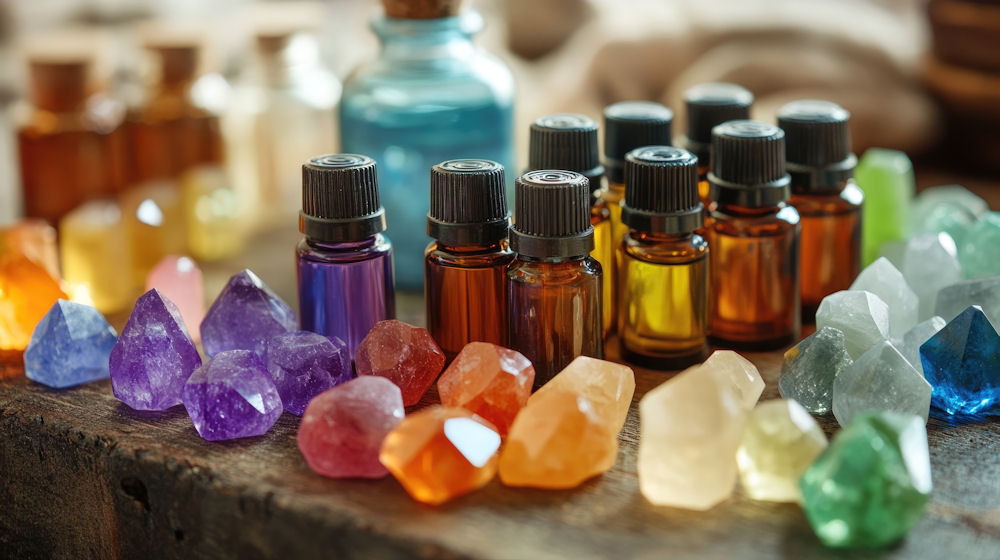When addiction grips a family, its impact ripples far beyond the individual struggling—it affects loved ones in profound and often unseen ways. Alcohol addiction alone affects over 14.5 million adults in the U.S., with countless families caught in the crossfires. Detox and tailored treatment are critical first steps in breaking this cycle, but recovery goes deeper. Research shows that holistic approaches, which include family involvement, improve long-term recovery rates significantly. At Arkview Recovery in Mechanicsburg, Pennsylvania, we understand the importance of addressing not just the person suffering from addiction but also the family’s role in healing. Through our comprehensive programs—ranging from drug and alcohol detox and residential treatment to outpatient services and dual diagnosis care—we help individuals and families rebuild, recover, and reclaim their lives together.
What are Essential Oils?
Essential oils are composed of volatile compounds, which means they can evaporate quickly and have strong aromas. These characteristics allow them to be easily inhaled or absorbed through the skin, delivering their properties directly to the body. Each essential oil has distinct characteristics, which can affect their application in alleviating symptoms associated with alcohol detox.
The Power of Essential Oils
Essential oils have been used for centuries for their aromatic and therapeutic properties. They are concentrated extracts derived from various parts of plants, including leaves, stems, flowers, and roots. Different oils possess unique properties that can aid the body in various ways, including mood elevation, stress reduction, and overall wellness enhancement.
When harnessed properly, certain essential oils can play a role in supporting the detoxification process, particularly during the challenging phases of alcohol withdrawal.
How Essential Oils Work in the Body
Essential oils interact with the body through different physiological pathways. For instance, when inhaled, the aroma molecules travel to the limbic system, which regulates emotions and memories. This interaction can promote relaxation, alleviate anxiety, and enhance mood. These benefits are particularly helpful during the emotionally turbulent times of detox. Some essential oils may offer antioxidant properties, supporting the body at a cellular level and helping to neutralize oxidative stress induced by alcohol consumption. Incorporating these oils into daily routines, whether through diffusion, topical application, or even in bath rituals, can create a holistic approach to recovery, fostering both physical and emotional healing during this critical time.
Specific Essential Oils for Alcohol Detox
Several essential oils are particularly beneficial during alcohol detoxification, including:
Lavender essential oil is renowned for its calming and soothing properties. During alcohol detox, anxiety and restless nights can often feel overwhelming. Lavender can help alleviate these feelings by reducing stress levels and promoting deep, restful sleep, which is crucial for the body’s recovery. Diffusing lavender or applying it (diluted) to pulse points can encourage a sense of relaxation and calm, allowing the body to repair itself.
Grapefruit essential oil offers powerful detoxification support. It helps promote healthy liver function, which is vital for eliminating toxins left behind by prolonged alcohol use. Its bright, citrusy scent also provides a gentle mood boost, counteracting the emotional lows many people experience during detox. This oil can be diffused, added to a warm bath, or even applied to the skin (when diluted) to enhance its benefits.
Peppermint oil is an excellent remedy for common detox symptoms like headaches, nausea, and digestive upset. Its refreshing aroma can have an immediate calming effect on an upset stomach, while its cooling properties provide relief from tension headaches. Adding a few drops of peppermint oil to a diffuser or inhaling it directly can provide quick relief and help ease the discomfort of withdrawal.
Lemon essential oil is widely known for its detoxifying qualities. It supports the body’s natural cleansing processes by aiding the liver and stimulating circulation, which can help flush toxins more effectively. Its invigorating scent also uplifts the mood, combating fatigue or sluggishness. Lemon oil works well in a diffuser or diluted in water as a zesty air freshener for an energizing burst.
Frankincense is a grounding and centering essential oil, offering emotional stability during the unpredictable rollercoaster of alcohol detox. Its calming aroma can help reduce stress, clear the mind, and even promote mindfulness—a powerful tool for addiction recovery. Using frankincense during meditation or deep breathing exercises can enhance relaxation and focus during challenging moments.
Rosemary essential oil is celebrated for its ability to support cognitive function and memory. Alcohol detox can lead to moments of “brain fog,” but rosemary oil’s stimulating properties help sharpen focus and improve mental clarity. Additionally, this oil supports liver detoxification, making it a twofold ally in recovery. Diffuse rosemary oil while working or resting to reap its benefits.
Tea tree oil is valued for its powerful cleansing and immune-boosting properties. An alcohol detox can temporarily weaken the immune system as the body focuses all its energy on repair. Tea tree oil can bolster immunity and help protect against illness. It’s also an excellent choice for purifying the air or creating cleansing body sprays when diluted properly.
Eucalyptus is an invigorating essential oil ideal for fighting fatigue and promoting respiratory health. Detox can sometimes leave individuals feeling drained, and eucalyptus helps clear both the mind and sinuses, encouraging deeper breathing and improved oxygen flow. Adding a few drops to a shower or diffuser creates a revitalizing environment that supports physical and mental energy.
Valerian root essential oil is prized for its sedative and calming effects, making it highly beneficial for reducing insomnia and restlessness during alcohol withdrawal. This oil encourages restful sleep, allowing the body to undertake essential repair work. Diffusing valerian root oil before bed or massaging it (diluted) into the skin can support a calmer nighttime routine.
Known for its digestive support and anti-inflammatory effects, ginger essential oil eases upset stomachs, nausea, and muscle pain—common symptoms of detox. Its warming and energizing properties can replenish low energy levels while supporting digestive health. Ginger pairs well with other oils like peppermint for even greater relief during detox.
Bergamot orange is a powerful mood enhancer and stress reliever, perfect for combating the emotional struggles tied to detox. This oil promotes relaxation while simultaneously uplifting the spirit, creating a sense of balance and positivity. Bergamot can be diffused or blended with other oils like lavender to amplify its mood-lifting effects.
Chamomile essential oil is a gentle and soothing option ideal for calming the nervous system during alcohol detox. It helps reduce anxiety, promote relaxation, and ease inflammation. Chamomile’s subtle, apple-like scent makes it a wonderful addition to a bedtime routine or mixed with a carrier oil for stress-relief massages.
Understanding Alcohol Detoxification
Alcohol detox is the process of removing toxic substances from the body, primarily ethyl alcohol. As the body adjusts to the absence of alcohol, it goes through numerous changes, often uncomfortable in nature. This transition can manifest in withdrawal symptoms that include anxiety, tremors, and nausea, necessitating a structured approach to ease the individual into recovery. During this phase, medical supervision is often recommended, as withdrawal can escalate to severe complications, including delirium tremens, which can be life-threatening if not properly managed.
It is essential to understand that detox is just the first step in a long journey toward sobriety. After detox, ongoing support through addiction therapy and lifestyle changes is vital for long-term recovery. The usage of complementary therapies, such as essential oils, can play a supportive role in this phase.
How Does Alcohol Detox Work?
At a biological level, detox hinges on the liver’s ability to filter out harmful substances. Alcohol is metabolized in the liver through a series of enzymatic reactions, converting it into harmless products that the body can eliminate. As the liver works tirelessly to detoxify, it can become overwhelmed, especially during the early stages of withdrawal. This is why understanding the timeline of detox is crucial; the first few days are often the most intense, with symptoms peaking before gradually subsiding as the body begins to heal. Science suggests that certain compounds found in essential oils may help support liver health. These compounds can stimulate the liver’s detoxification enzymes or help reduce inflammation, potentially facilitating a smoother detox process.
The Role of the Liver in Detoxification
The liver is the body’s primary detoxifying organ. It performs a myriad of functions essential to health, including bile production and nutrient storage. When challenged by excessive alcohol consumption, the liver can become inflamed, fatty, or even damaged. Chronic alcohol use can lead to conditions such as fatty liver disease, alcoholic hepatitis, and cirrhosis, all of which underscore the importance of liver health in the context of alcohol detox. Supportive measures, such as consuming nutrient-dense foods and integrating essential oils, may assist the liver in its detoxifying activities. A holistic approach that combines nutrition, hydration, and possibly herbal support can significantly enhance the liver’s ability to recover and function optimally during the detox process.
It is crucial to dilute essential oils in a carrier oil before applying them to the skin, as undiluted oils can cause irritation. Additionally, consult with a healthcare professional before starting any new treatment, especially during detox. Choosing high-quality, therapeutic-grade essential oils is also important. Low-quality oils might contain additives or impurities that could hinder the desired effects or introduce harmful substances into the body.
Essential oils can be applied in several ways during the detox process:
- Aromatherapy: Diffusing essential oils in the home can create a calming atmosphere and provide continuous benefits throughout the day.
- Topical Application: Using diluted oils on pulse points or areas of discomfort can help provide relief from symptoms associated with detoxification.
- Baths: Adding a few drops of essential oils to a warm bath can create a relaxing experience, further supporting emotional and physical detox.
The Benefits and Risks of Essential Oils for Detox
While the potential benefits of using essential oils during alcohol detox are significant, acknowledging possible risks and side effects is equally important. A balanced approach ensures that individuals can safely harness the healing properties of essential oils without adverse effects.
Potential Benefits of Essential Oils in Alcohol Detox
The benefits of incorporating essential oils into alcohol detox can be multifaceted. Some of the possible advantages include:
- Emotional Support: Essential oils can alleviate anxiety and depression symptoms, promoting a positive mood.
- Physical Relief: Specific oils may help ease physical discomfort related to withdrawal symptoms.
- Enhanced Detoxification: Many essential oils have detoxifying qualities that can support the body’s natural elimination processes.
Possible Risks and Side Effects
While essential oils are often viewed as safe, they can pose risks, especially for individuals with certain health conditions. Some possible side effects may include:
- Skin irritation from undiluted oils.
- Allergic reactions or sensitivities to specific oils.
- Potential interactions with medications or other treatments.
Understanding these risks is crucial to ensure a safe and beneficial experience when integrating essential oils into the detox process.
Do You Want to Learn More About Alcohol Detox?
Alcohol detox is a challenging yet vital step in the recovery process, and finding ways to ease the physical and emotional symptoms can make all the difference. Essential oils bring unique benefits to the detox process. Whether it’s calming anxiety, alleviating nausea, supporting liver function, or promoting restful sleep, these oils can provide comfort and help the body heal during this critical time.
However, it’s essential to remember that essential oils are most effective when used as part of a holistic approach to recovery. Combining natural remedies with professional medical care ensures that the detox process is safe, thorough, and tailored to your individual needs. By partnering with a trusted substance abuse treatment program and incorporating supportive practices like essential oil therapy, you can create a more balanced and empowered recovery experience. If you’re on the path to overcoming alcohol addiction, reach out to Arkview Recovery today to learn more about our services.

Kyle is Lead Therapist at Arkview Recovery Center. He holds a Master of Social Work degree from Temple University and is a Licensed Clinical Social Worker. He has years of experience working directly with individuals who suffer from addiction and mental health disorders. Being in long term recovery himself, Kyle is very passionate about the recovery process. He is heavily involved in the local recovery community in which he enjoys his commitments to service and giving back. His specialty is in group therapy and developing clinical staff. Kyle brings to Arkview a holistic approach to recovery, specializing in mindfulness, reality therapy, and solution-focused therapy.









